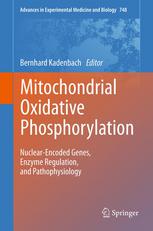

Most ebook files are in PDF format, so you can easily read them using various software such as Foxit Reader or directly on the Google Chrome browser.
Some ebook files are released by publishers in other formats such as .awz, .mobi, .epub, .fb2, etc. You may need to install specific software to read these formats on mobile/PC, such as Calibre.
Please read the tutorial at this link: https://ebookbell.com/faq
We offer FREE conversion to the popular formats you request; however, this may take some time. Therefore, right after payment, please email us, and we will try to provide the service as quickly as possible.
For some exceptional file formats or broken links (if any), please refrain from opening any disputes. Instead, email us first, and we will try to assist within a maximum of 6 hours.
EbookBell Team

4.3
98 reviewsThis book will describe the nuclear encoded genes and their expressed proteins of mitochondrial oxidative phosphorylation. Most of these genes occur in eukaryotic cells, but not in bacteria or archaea. The main function of mitochondria, the synthesis of ATP, is performed at subunits of proton pumps (complexes I, III, IV and V), which are encoded on mitochondrial DNA. The nuclear encoded subunits have mostly a regulatory function. However, the specific physiological functions of the nuclear encoded subunits of complexes I, III, IV, and V are mostly unknown. New data indicates that they are essential for life of higher organisms, which is characterized by an adult life without cell division (postmeiotic stage) in most tissues, after the juvenile growth. For complex IV (cytochrome c oxidase) some of these subunits occur in tissue-specific (subunits IV, VIa, VIb, VIIa, VIII), developmental-specific (subunits IV, VIa, and VIIa) as well as species-specific isoforms. Defective genes of some subunits were shown to induce mitochondrial diseases. Mitochondrial genes and human diseases will also be covered.